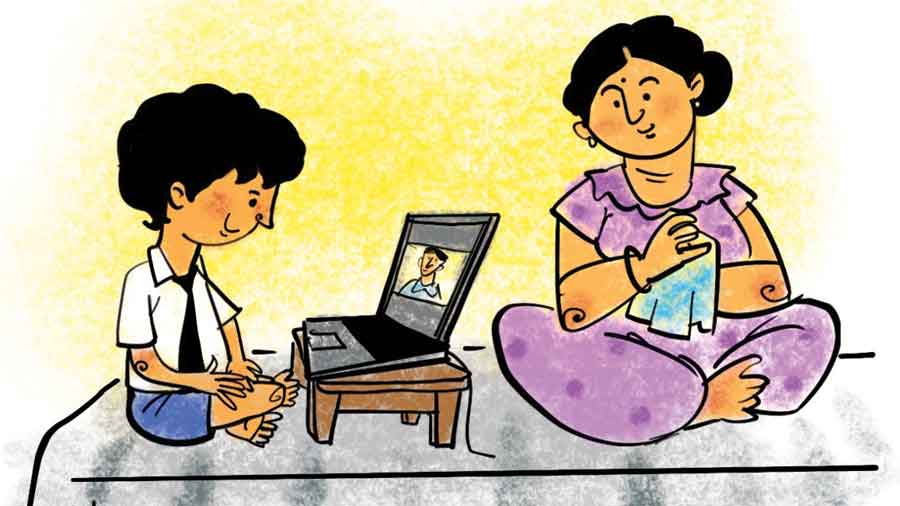The mother of a seven-year-old sees off her child at the school gate. But she doesn’t leave. She stands till the daughter enters the building. She still doesn’t leave. After a while, she pleads with the gate-keeper to go check if the girl has reached her class or not.
She still doesn’t leave. She requests teachers walking in through the gate to check on the child and inform her what she is doing in class. The child may have settled down by then and be busy chatting with friends inside but the mother is often spotted at the gate, in tears.
This isn’t a lone case. School apps are flooded these days with messages from parents asking petty questions such as if the child ate his tiffin, drank water and if at all he reached the classroom after walking up the corridor.
The fact that parents could supervise even the classroom situation during the months of online classes made many of them happy. During the lockdown, parents felt they could be live spectators to the classroom. Even during exams, they dictated or even wrote down answers for their kids. But now that physical classes are back many parents are unable to give up control.
It’s making them nervous to imagine the child having to do everything by himself. Psychologists say such actions are symptoms of separation anxiety among parents.
Sense of void
“My wife feels like she has nothing to do when our daughter is away in school. Even if the child is at home with her grandparents’, my wife constantly wants to know what she is up to. She thinks about the child all the time and gets stressed. Even when we tell her to relax, she says she can’t get the thought out of her mind,” says Indraneel Gupta, a software engineer from FD Block.
Much to miss
While parents are happy to see their kids settling down into a daily routine at school, many are not happy forgoing the time they would spend together.
“When it comes to parenting and spending time with children, the pandemic had a very positive outcome,” says Imon Bhattacharya Neogi, consultant psychologist and school counsellor associated with several reputed schools and hospitals in the city.
“Often we hear people saying it’s not quantity but quality time that makes the difference. But in many ways quantity time with children also matters. It is important to spend a lot of time with them at regular intervals. Since both parents are working these days, quality time has become rare. For instance, before the pandemic when fathers came home late at night they would find children fast asleep. Again, in the morning when the kids woke up to go to school the dads would be asleep. This created a wide communication gap between the two, that dissolved when all were working and studying from home during the pandemic.”
Faced with the absence of domestic helps, kids chipped in to help with chores, cutting or peeling vegetables and fruits, collecting peas from a pod... “Cooking together and following a recipe is something children loved doing. It was exciting for them and inculcated organisational skill.
Swagata Chakraborty, who works for a Sector V company, misses her daughter too. “Earlier when we were working from home I got to spend a lot of time with her. Now I hardly see her as she’s busy with homework or projects when I get home. We don’t talk as much as we used to during the lockdown. I feel bad that I am missing out on our time together,” she rues.
Therapists term this deep void or emptiness as separation anxiety. “Separation anxiety is when someone is afraid of being apart from their loved ones or of losing a person, all because of being emotionally attached to the person,” explains consultant psychologist Asit Baran Ghosh, who runs a mental health clinic.
While most people associate this condition with children, experts say adults can experience separation anxiety too. “In fact, an adult can develop extreme anxiety due to separation or anticipated separation from a specific attachment figure. This can be a person, place or even an animal. It can be so severe that there can be physical manifestations like nausea and headaches,” says Ghosh

Illustration: Roudra Mitra
Bond with your kids
- Learn to play an instrument together
- Play ludo, chess or outdoor sports
- Paint, garden, work on mandala colouring books
- Make reels for social media
- Watch movies on weekly basis or visit museums
- Instead of burying your face in your phone, talk to your child during mealtime
Development came about through regular activities in life and this in turn helped in their brain development. They became more responsible towards the house and their surroundings,” she added.
But now school, tuition, singing and dancing classes are eating into parents’ time with kids. “A lot of parents are travelling for work again and the only talking that happens is over the phone,” says Ghosh. “I have several patients coming to me with such issues. They are finding it difficult to travel for work. Others are feeling guilty about being away,” added Ghosh.
Solutions at hand
You may not have quantity time with the kids anymore but you can still make the most of it. “Creative activities must take centre-stage. Children have bonded with parents over learning to play an instrument together, dancing, making reels for social media etc. These should be continued,” Bhattacharya Neogi suggests.
Play outdoor or indoor games like ludo, chess, cards and Uno, watch movies together, visit the museum…. You could also paint, garden or complete mandala colouring books together.
Ghosh asks people to cut down on multi-tasking. “This will reduce stress levels and one will be able to relax and spend more time with family, listen to each other and communicate,” he says.
Bhattacharya Neogi agrees. “We need to be mindful. That cannot happen if we are constantly running after something or the other. Stop and breathe! These days people are so busy with their phones during meal times they don’t even realise what we are eating! Savour your food and the company of your children to make the most of it,” she says.
Write to saltlake@abp.in
